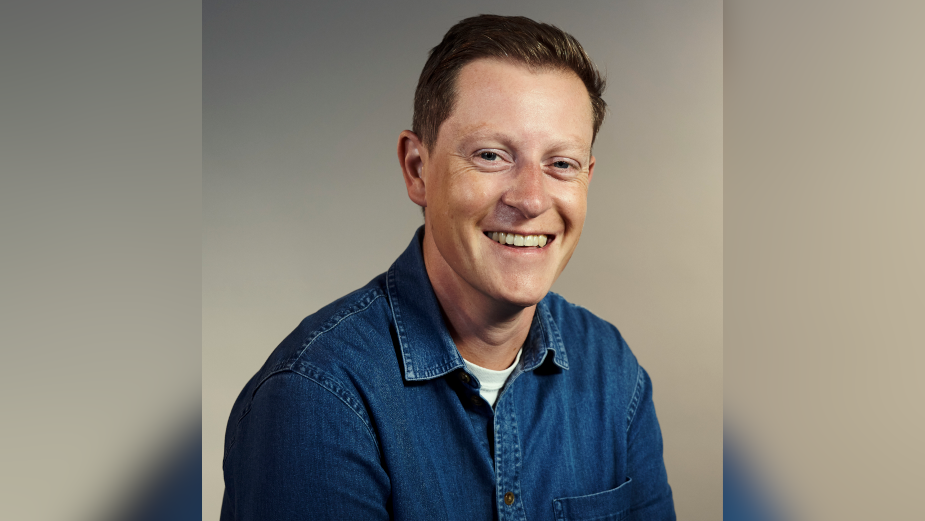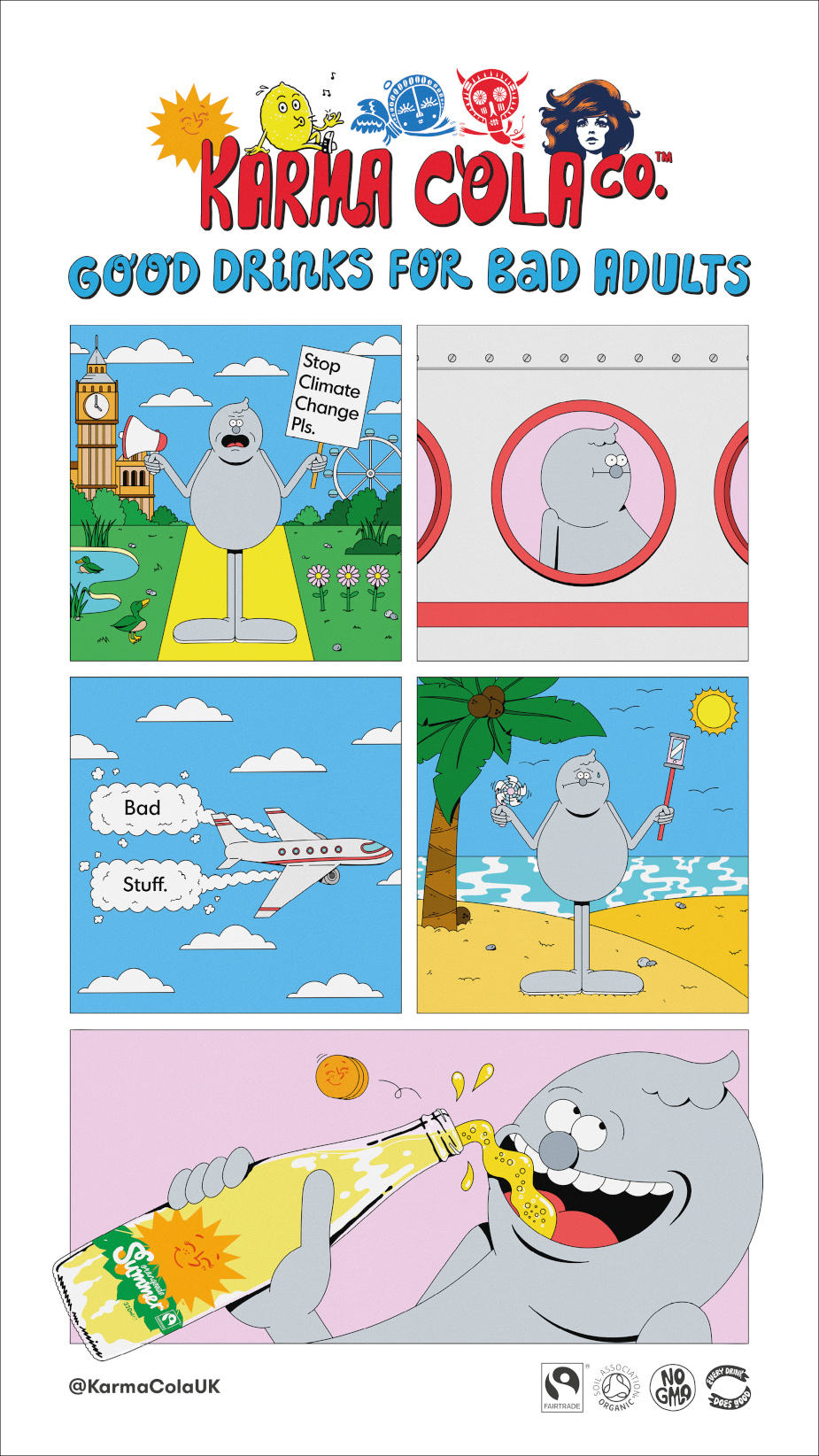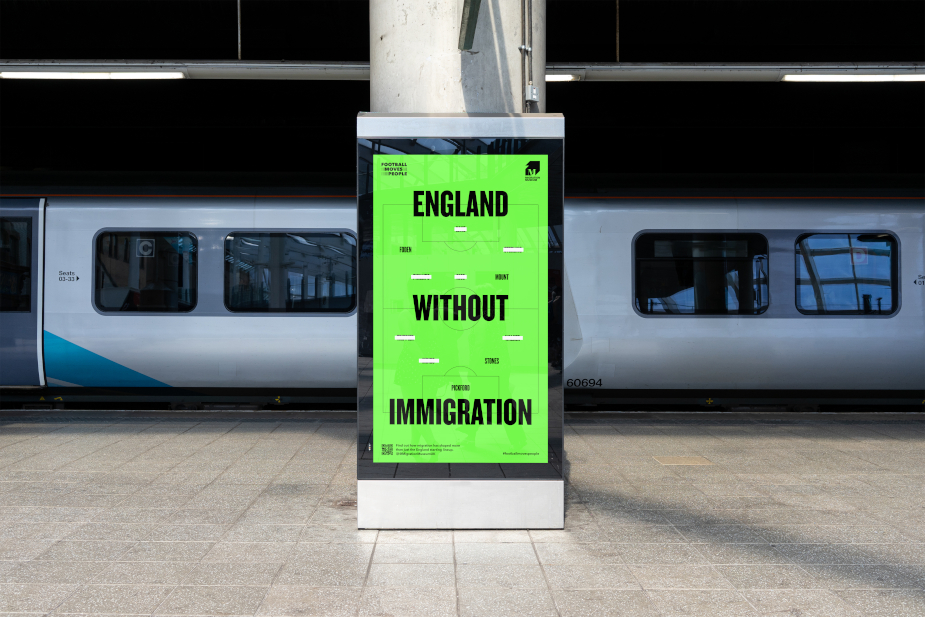
Planning for the Best: Over-the-Desk Chats with Nick Exford

Last month, Wonderhood Studios promoted Nick Exford to become the agency’s first Head of Planning.
Nick was one of the first major hires Wonderhood Studios made, when he was poached from Wieden + Kennedy London in September 2018.
Since then, he’s applied his strategic expertise to help win new business with Starling Bank, Mizkan, Motorway and his former client Three, an account which he now leads. He played a pivotal role in the launch of Three’s new brand platform ‘Life Needs a Big Network’ which ran across all touchpoints from TV to instore, digital, social and OOH, and was designed to help the brand come of age.
Other notable projects include Branston’s ‘Hit of Home’ campaign which generated a long-term ROI of £2.80, and Starling Bank’s ‘Helping Businesses Fly’ which led to a 30% increase in brand awareness as they became the UK’s fastest growing business bank. Nick also led the thinking on the recent ‘Football Moves People’ campaign for the Migration Museum.
LBB> What do you think is the difference between a strategist and a planner? Is there one?
Nick> I think they’re very interchangeable in industry parlance, but ‘strategist’ feels a bit closer to the actual job we do than ‘planner’.
LBB> And which description do you think suits the way you work best?
Nick> Well, my official title at Wonderhood is Head of Planning, so I’ll have to contradict my previous answer and go with ‘planner’, so I don’t do myself out of a job.
LBB> We’re used to hearing about the best creative advertising campaigns, but what’s your favourite historic campaign from a strategic perspective? One that you feel demonstrates great strategy?
Nick> I’ve always been a fan of creative strategies that make a potential weakness or negative trait about the brand, product or audience a strength. Marmite’s ‘You either love it or you hate it’; Snickers’ ‘You’re not you when you’re hungry’; Guinness’ ‘Good things come to those who wait’. They each have such a strong inherent tension and truth at the heart of them. It’s no surprise that many of them have run successfully for years and evolved in so many interesting ways creatively.
LBB> When you’re turning a business brief into something that can inform an inspiring creative campaign, do you find the most useful resource to draw on?
Nick> I draw on a bit of everything. Speaking to people at the brand who work outside of the marketing team is often a really enlightening place to start. Speaking to people in the real world who don’t think much about the brand, category or advertising in general, but are who the brand’s future growth depends on. Speaking to creatives to get their gut instincts before I write the brief. Thinking about what’s going on in society and culture that might be relevant - what people are watching, reading, listening to. What people are talking about on social. What people are searching for around the brand. Insight and inspiration can come from so many places.
At Wonderhood we have a data strategy team who help gather a lot of those kinds of insights at pace and who are brilliant people to stress test creative starting points with. We push and challenge each other a lot, which helps us get to sharper thinking. If there hasn’t been some level of dissent or disagreement in the process, we tend to worry we don’t have anything good yet!
LBB> What part of your job/the strategic process do you enjoy the most?
Nick> I really enjoy pitches. They give you a 4–6-week crash course in a brand, business and category you’ve often never worked in before, and are full of the kind of strategic and creative possibility that only really comes from being unencumbered by the shackles of previous experience and preconceptions.
I also love working with smaller brands or organisations who have big ambitions but often tiny budgets to play with. You tend to find they’re generally up for a more provocative strategic and creative point of view and shape of idea than many bigger brands, because they know they can’t afford to simply buy attention, but have to earn it too.
The work we’ve done in the past with brands like Karma Cola and our ongoing partnership with The Migration Museum is testament to that.


LBB> What strategic maxims, frameworks or principles do you find yourself going back to over and over again? Why are they so useful?
Nick> A strategist’s most important job - and where they add the most value for their agencies and clients - is to take often incredibly complex problems and make them simple and solvable. Some planners can fall into the trap of wanting to demonstrate they’re the smartest person in the room, rather than the most useful. That can lead to death by PowerPoint, too many data points and too much marketing jargon instead of plain English, which ends up watering down or over-complicating their thinking.
It’s always good to ask yourself whether your mum or a mate outside of the industry could understand your strategy if you talked them through it. If they probably wouldn’t get it or would likely roll their eyes at some of the marketing buzzwords you’ve referenced, you need to simplify.
LBB> What sort of creatives do you like to work with? As a strategist, what do you want them to do with the information you give them?
Nick> The kind that value, question and challenge my thinking, who help sharpen it with me, and will push the work to interesting and exciting places you wouldn’t expect. I love an impromptu over-the-desk or down-the-pub chat with creatives about the work, too. Often that’s where you find you end up cracking a problem or coming up with a great idea, rather than in a big team review.
LBB> There’s a negative stereotype about strategy being used to validate creative ideas, rather than as a resource to inform them and make sure they’re effective. How do you make sure the agency gets this the right way round?
Nick> I think there’s a difference between planning helping to shape a new creative idea to ensure it is on-strategy – which I don’t see anything wrong with – and planning being prepared to deviate wildly from the strategy just to sell in a cool creative idea that is unlikely to achieve the client’s core marketing objectives – which is pretty much a dereliction of duty.
Some of the best and most effective campaigns I’ve worked on weren’t formally briefed by the client. They were proactive creative ideas that the agency and client could see would help serve the long-term strategic objectives of the brand, regardless of how they originated.
For that to happen, it’s essential that everyone – from planning to creatives to the clients – is fully bought into that long-term strategy and understands how creative ideas can help drive it forward, rather than diverge from it.
LBB> What have you found to be the most important consideration in recruiting and nurturing strategic talent? And how has Covid changed the way you think about this?
Nick> You can learn most of the stuff you need to be a successful strategist on the job through experience, training and working with other brilliant planners, creatives and account people. But I’m not sure you can learn the trait I see in every great strategist, which is a relentless curiosity about people, culture and how the world works.
I think it’s also important when recruiting talent that you hire people who don’t just think like you, but who have different backgrounds, perspectives and interests which shape their view on the world. And it’s important that you help them find their own voice and way of approaching strategy, rather than forcing them to follow a set process or template that might work well for you.
Covid has shown the industry that we can generally work remotely better than many people had probably anticipated, but as we’ve started to return to the office more regularly in the last few months, it’s also reminded us of what we’ve been missing and the power of real face-to-face interaction. So, the big thing I’m thinking about a lot at the moment – along with pretty much everyone else, I’d imagine – is how we strike the right balance between remote work and being together in the same room, as each has their own benefits and drawbacks.
LBB> In recent years it seems like effectiveness awards have grown in prestige and agencies have paid more attention to them. How do you think this has impacted on how strategists work and the way they are perceived?
Nick> I think the best agencies and brands have always paid a lot of attention to effectiveness awards, but the recent backlash against the ineffectiveness of many short-term “Cannes-bait” campaigns has perhaps put effectiveness awards more firmly in the spotlight for many more clients, too.
For strategists at any level, crafting effectiveness case studies is a brilliant way to hone your skills and make yourself an essential ally to your clients when they need to justify the value of marketing to the CFO, CEO or shareholders of the business.
Effectiveness is a huge part of the planning culture at Wonderhood, and case studies have already helped us win new business from brands that can see we take it seriously and are able to point to strong commercial results from the creative work we’re already doing for our other clients.
LBB> Do you have any frustrations with planning/strategy as a discipline?
Nick> It’s a reality of the ever-accelerating world we now live in, but I am sometimes jealous of all the extra time, money and space that planners seemingly had to really dig into a brief in the pre-internet age.
Of course, these great advances in technology have made our jobs easier in many ways, but they’ve also contributed to massively crunched campaign development timelines, vastly increased complexity when it comes to media selection and comms planning, reduced qualitative research opportunities to go out and speak to people in the real world, and just generally less time to think.
I can’t see that trend reversing, so strategy must continue to adapt and find ways to solve problems more quickly, without sacrificing too much sharpness or robustness in our thinking. One way we’re navigating that challenge at Wonderhood is what we call ‘parallel planning’ – teaming data strategists with brand strategists to approach briefs from different perspectives and skillsets, and hopefully getting to interesting and unexpected areas more quickly.
But I still occasionally daydream about what it must’ve been like in the past to have a year to work on a big brief, with a huge research budget, and without the constant ping of emails and wall-to-wall Zoom meetings getting in the way!
LBB> What advice would you give to anyone considering a career as a strategist/planner?
Nick> First off - and this applies to pretty much any job in adland, but I think particularly in strategy - you need to have an entirely abnormal interest with brands and the way they behave compared to the rest of the general population. It mustn’t be the only thing you have an interest in, but you can’t be a complete snob or cynic about advertising if you’re going to succeed as a planner. You need to feel excited about how you can combine the logical and creative parts of your brain in service of selling stuff for companies. Happily, the most proven way of doing that is by impacting and becoming part of broader culture, so you can still talk to your mates about it in the pub when you get it right.
Secondly, read, watch and listen to everything about planning, human behaviour and marketing effectiveness you can get your hands on, from books by advertising legends, to IPA papers on campaigns you’ve always admired, to APG talks on YouTube, to brilliant podcasts like ‘On Strategy’.
Finally, if all that hasn’t entirely put you off the idea, reach out to other planners in the industry and ask to speak to them. In my experience, most strategists are very generous with their time and wisdom and will happily offer their perspectives and advice if you ask them.













